初三上学期英语知识点
九年级上册英语全部知识点

九年级上册英语全部知识点Unit 1: Greetings and Introductions- Greetings: Hello, Hi, Good morning/afternoon/evening- Introducing oneself: My name is..., I am..., Nice to meet you- Asking for others' names: What's your name? Could you tell me your name, please?- Saying goodbye: Goodbye, Bye, See you laterUnit 2: School Life- Classroom objects: desk, chair, board, computer, book- School subjects: English, Math, Science, History, Geography- Talking about schedules: What classes do you have on Mondays? My first class is English.- Talking about preferences: I like English, I don't like Math.Unit 3: Daily Routine- Expressing daily activities: I get up at 7 o'clock. I have breakfast at 7:30.- Using time expressions: in the morning, in the afternoon, in the evening- Talking about frequency: I usually brush my teeth twice a day.Unit 4: Hobbies and Interests- Talking about hobbies: I like playing soccer, drawing, reading books.- Expressing preferences: I prefer playing video games to watching TV.- Inviting others: Do you want to play basketball with me?Unit 5: Family and Friends- Talking about family members: I have a brother and a sister. My mother is a teacher.- Describing physical appearance: My brother has short black hair and blue eyes.- Talking about relationships: She is my best friend. He is my cousin.Unit 6: Food and Health- Describing food: I like pizza with cheese and vegetables.- Talking about healthy habits: It's important to eat fruits and vegetables.- Expressing opinions: I think fast food is not good for our health.Unit 7: Travel and Holidays- Talking about vacation plans: I want to visit Paris during the summer vacation.- Asking for directions: Excuse me, could you tell me how to get to the train station?- Talking about past travels: Last year, I went to the beach with my family.Unit 8: Around the World- Talking about different countries: China, Italy, Australia, Japan- Describing famous landmarks: The Great Wall of China, The Colosseum, The Sydney Opera House- Comparing cultures: In China, people eat with chopsticks. In Italy, they eat pasta.Unit 9: Environmental Issues- Talking about environmental problems: pollution, deforestation, global warming- Expressing concerns: We need to recycle and reduce waste.- Talking about actions: We can use public transport instead of driving.Unit 10: Future Plans- Talking about future careers: I want to be a doctor and help people.- Expressing ambitions: I hope to travel around the world one day.- Talking about future plans: After graduation, I want to go to university.以上是九年级上册英语的全部知识点。
九年级英语上册知识点大全
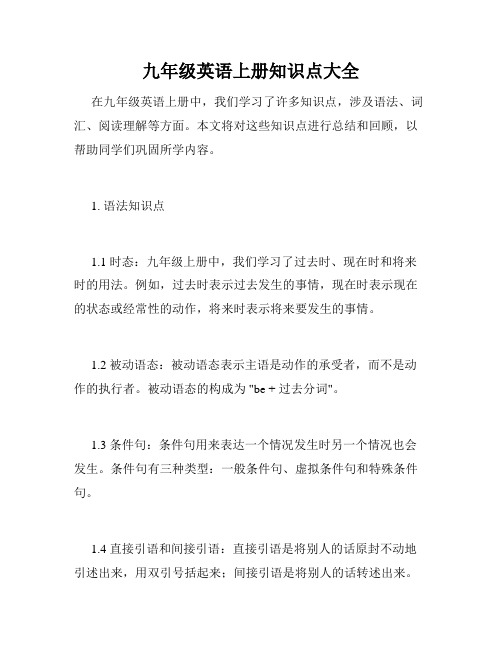
九年级英语上册知识点大全在九年级英语上册中,我们学习了许多知识点,涉及语法、词汇、阅读理解等方面。
本文将对这些知识点进行总结和回顾,以帮助同学们巩固所学内容。
1. 语法知识点1.1 时态:九年级上册中,我们学习了过去时、现在时和将来时的用法。
例如,过去时表示过去发生的事情,现在时表示现在的状态或经常性的动作,将来时表示将来要发生的事情。
1.2 被动语态:被动语态表示主语是动作的承受者,而不是动作的执行者。
被动语态的构成为 "be + 过去分词"。
1.3 条件句:条件句用来表达一个情况发生时另一个情况也会发生。
条件句有三种类型:一般条件句、虚拟条件句和特殊条件句。
1.4 直接引语和间接引语:直接引语是将别人的话原封不动地引述出来,用双引号括起来;间接引语是将别人的话转述出来。
在转述时,需要根据语法要求对动词、代词、时态等进行相应的转换。
2. 词汇知识点2.1 同义词和反义词:同义词是指意义相近或相同的词语,反义词则是指意义相反的词语。
通过学习同义词和反义词,可以丰富词汇,提高表达能力。
2.2 词汇搭配:词汇搭配是指某些词语之间常常会搭配在一起使用。
例如,"make a decision"、"take a shower"等。
学习这些搭配可以帮助我们更准确地表达意思。
2.3 词义辨析:有时候两个词语的意思相似,但用法不同。
学习这些词义辨析可以避免在表达时使用错误的词语。
3. 阅读理解知识点3.1 主旨大意题:主旨大意题要求从文章中归纳出作者想要传达的核心信息。
3.2 细节题:细节题要求根据文章中的具体信息进行回答。
3.3 推理题:推理题要求根据文章中的线索进行推断,并做出合理的判断。
3.4 词义猜测题:词义猜测题要求根据上下文和线索猜测生词的意思。
4. 写作知识点4.1 书信写作:九年级上册中,我们学习了如何写一封书信,包括信的格式、语气和内容等。
九年级上册英语必背知识点
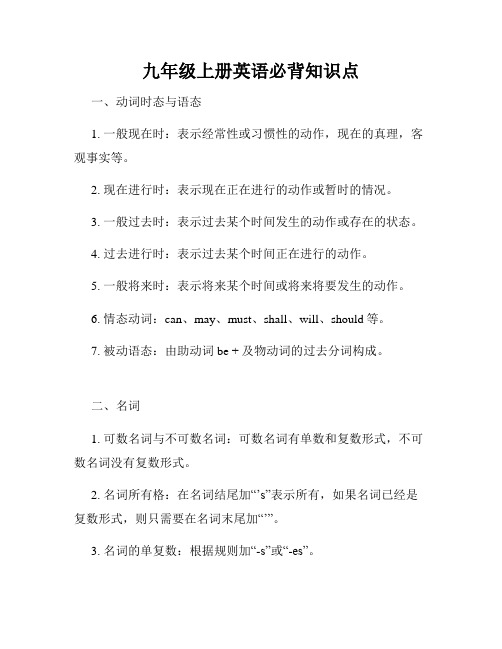
九年级上册英语必背知识点一、动词时态与语态1. 一般现在时:表示经常性或习惯性的动作,现在的真理,客观事实等。
2. 现在进行时:表示现在正在进行的动作或暂时的情况。
3. 一般过去时:表示过去某个时间发生的动作或存在的状态。
4. 过去进行时:表示过去某个时间正在进行的动作。
5. 一般将来时:表示将来某个时间或将来将要发生的动作。
6. 情态动词:can、may、must、shall、will、should等。
7. 被动语态:由助动词be + 及物动词的过去分词构成。
二、名词1. 可数名词与不可数名词:可数名词有单数和复数形式,不可数名词没有复数形式。
2. 名词所有格:在名词结尾加“’s”表示所有,如果名词已经是复数形式,则只需要在名词末尾加“’”。
3. 名词的单复数:根据规则加“-s”或“-es”。
1. 人称代词:I、you、he、she、it、we、they等。
2. 物主代词:mine、yours、his、hers、its、ours、theirs等。
3. 反身代词:myself、yourself、himself、herself、itself、ourselves、yourselves、themselves等。
4. 指示代词:this、that、these、those等。
5. 疑问代词:who、whose、whom、what、which等。
6. 关系代词:that、which、who、whom、whose等。
四、形容词与副词1. 形容词的用法:修饰名词时放在名词前面,修饰不定代词时放在后面。
2. 形容词比较级与最高级:一般在形容词后面加“-er”表示比较级,加“-est”表示最高级。
3. 形容词的位置:一般在连系动词后面作表语,也可用于作定语或宾补。
4. 副词的用法:修饰动词、形容词或其他副词。
1. 地点介词:in、on、at、under、over、below、above等。
2. 时间介词:in、on、at、before、after、during等。
九年级上册英语复习知识点

九年级上册英语复习知识点推荐文章九年级上册道德与法制知识点热度:九年级思想品德的复习知识点热度:九年级上册思想品德知识点热度:人教版九年级上册政治知识点热度:化学九年级上册知识点热度:知识的宽度、厚度和精度决定人的成熟度。
每一个人比别人成功,只不过是多学了一点知识,多用了一点心而已。
下面小编给大家分享一些九年级上册英语复习知识,希望能够帮助大家,欢迎阅读!九年级上册英语复习知识1一.短语归纳1.a pair of 一对,一双,一副2.between A and B在a和b之间3.on one’s / the way to 在去……的路上4.pardon me 什么,请再说一遍5.pass by 路过经过6.look forward to 盼望期待7.excuse me 打扰了请原谅8.get some magazines 得到一些杂志9.get some information about 获取有关……的一些信息10.turn left\right 向左\向右转11.go past 经过路过12.a little earlier 早一点儿13.a good place to eat 一个吃饭的好地方14.in different situation 在不同的情况下15.on time 准时按时16.get to 到达17.have dinner 吃晚餐18.on one’s / \the right在右边e on 快点请过来20.the shopping center 购物中心21.the corner of....... 的角落/拐角处22.lead into 导入引入二.用法集萃1.not ……· until……直到……猜……You never know until you try something.2.let’s do sth 咱们做某事吧!3.spend time doing sth 话费时间做某事4.thank sb for doing sth 为做某事而感谢某5.would liketo do sth 想要做某事6.look forward to doing sth 盼望做某事7. It seems(that)…It seems a rockband plays there every evening.8. Could youplease tell me... ?Could you please tell me how to get to thepost office?9.take的用法① take somefoodtake some medicine (=have吃,喝)② take notes做笔记③ take one’s temperature ( 测量)④ It takes sb sometime/money to do something (花费,需要)⑤ I’ll take thiscoat.(=buy购买)⑥ take somebody /something to (带领,拿去,取)⑦take a train toChongqing (乘坐) ⑧take off(脱下)10.turn 的用法turn to page 80 翻到It is your turn.轮到你了。
九年级英语上册单元重要知识点总结

九年级英语上册单元重要知识点总结九年级英语上册共有8个单元,包括Unit 1 My New Teachers、Unit 2 How Often Do You Exercise、Unit 3 I'm more outgoing than my sister、Unit 4 Don't eat in class、Unit 5 What are the shirts made of、Unit 6 I'm going to study computer science、Unit 7 Would you mind turning down themusic、Unit 8 How do you make a banana milk shake?下面对每个单元的重要知识点进行总结:Unit 1 My New Teachers1.介绍自己和他人的基本信息,包括姓名、年龄、学校、家庭成员等。
2.学习询问他人的基本信息,如What's his/her name? How old is he/she?Which school does he/she go to?等。
3.学习询问他人的职业和爱好,如What does he/she do? What are his/herhobbies?等。
4.学习表达个人的职业和爱好,如I'm a student. My hobbies are playingbasketball and listening to music.等。
Unit 2 How Often Do You Exercise1.学习询问他人的日常活动频率,如How often do you exercise? Howoften does he/she watch TV?等。
2.学习回答关于日常活动频率的问题,如I exercise three times a week.He/She watches TV every day.等。
九年级英语上册各单元知识点归纳

九年级英语上册各单元知识点归纳第一单元:基础知识1. 介词短语的使用:介词短语是由一个介词和它的宾语组成的短语,用来表示时间、地点、方向、原因等。
例如:"on the table"(在桌子上),"in the park"(在公园里)。
介词短语在句子中作状语、定语、宾语等。
需要注意介词与宾语之间的搭配。
2. 动词的时态和语态:英语中的动词有多种时态和语态。
常见的时态有一般现在时、一般过去时、一般将来时等。
常见的语态有主动语态和被动语态。
时态用于表示动作发生的时间,语态用于表示动作的执行者。
例如:"She is reading a book."(她正在读一本书)。
需要注意时态和语态的用法和变化规则。
3. 名词的单复数形式:英语中的名词有单数和复数形式。
复数形式一般是在名词后面加-s或-es。
有些名词的复数形式较特殊,需要记忆。
例如:"a cat"(一只猫)的复数形式是"cats"(多只猫)。
需要注意名词的单复数形式在句子中的搭配和用法。
第二单元:阅读理解1. 完型填空:完型填空是一种考察学生对语境理解和词汇运用能力的题型。
在完型填空中,通常给出一篇文章和一些空格,要求学生根据文章内容和语境选择正确的单词或短语填入空格中。
通常需要结合文章整体逻辑和上下文意义来填写正确答案。
2. 阅读理解题:阅读理解题是一种考察学生阅读理解能力和推理能力的题型。
通常会给出一篇短文或文章,然后根据文章内容提出一些问题,要求学生根据文章内容和推理来回答问题。
需要学会熟练阅读和理解文章,抓住关键信息和主题,并能运用推理等能力来回答问题。
第三单元:语法知识1. 直接引语和间接引语:在英语中,当我们引述别人的话时,可以使用直接引语和间接引语。
直接引语是直接引用别人所说的话,使用引号将其包围;间接引语是将别人所说的话转述出来。
例如:直接引语:"I am happy," she said.(她说:“我很开心。
九年级上册英语语法知识点总结

九年级上册英语语法知识点总结Unit 1Topic11 it’s + adj +to do sth. 做、、、是…样的2 come back from 从、、、回来3 take place 发生4 more and more 越来越多5 have been to 去过、、、6 have gone to 去了、、、7 take photos 照相8 take part in 参加9 have no time to do没时间做、、、10 in detail 详细的11 in order to 为了12 afford 负担得起support支持13 get a good education 受好教育14 see …oneself亲眼所见15 have a chance to do 16有机会做、、、16 Keep in touch with保持联系17 far away 远离18 reform and opening-up改革开放19 not only …but also 不但而且20 make rapid progress取得巨大进步21 prefer A to B更喜欢A22 现在完成时结构:肯:S+ have\has +动分否:S+ have\has + not +动分疑:Have\has+S+动分答:Yes, S+ have\has No, S+ haven’t\hasn’tUnit 1Topic21 get lost;走失,迷路2 so do I .我也如此否:neither +be\do\情态动词+主语so +主语+ be\助动词\情态动词(表达两者对同一事物的看法) A 如此,A的确如此3 it seems that+从句4 population 人口,居民常用large或small来修饰5 happen 碰巧发生, 指偶6 take the place of代替、、、的位置7because 因为,连接从句because of +n.\v-ing 短语8 be strict with sb 对某人要求严格be strict in(doing )sth 对做某事要求严格9increase by 表示:增加了、、、10increase to+具体的增长后的数字11 反义疑问句:前肯后否,前否后肯12 carry out 实行,进行,执行13 What’s the population of...?=What’ the number of the people in ...?14one child policy 独生子女政策15developing country发展中国家16 developed country 发达国家17数字的读法来试着总结一下: 1)三个数字为一组 2) 百位和十位之间用and连接(如果没有十位,百位和各位之间也用and连) 2)thousand (三位数前)million(六位数前)billion (九位数前)18cause;引起,导致=bring about19分数:母序子基,分子大于1,分母加s四分之一亦作:a quarter 二分之一亦作:a half20be short of 缺乏21be short for 是、、、的缩写22be known as =be famous as作为、、、而闻名23be famous for因为、、、而闻名 be famous in 在、、方面而闻名24work well in doing sth.做的好25take measures to do sth. 采取措施做某事26 offer to do sth. 主动提出要做某事 offer sb sth 给某人提供某物27prefer: 更喜欢1)preferA toB 和A比较更喜欢B2) prefer doing sth. 更喜欢做某3)prefer to do rather than do sth.宁愿而不28 called =named= with the name of 叫做29 unless 除非,如果不= if not30 a couple of 一对,一双,夫妇31 a place of interest一处名胜32现在完成时态二:1现在完成时不能和明确的表示过去的时间状语联用,如:yesterday, last week, in 1999等,它们适用与一般过去时。
九年级上册英语必备知识点

九年级上册英语必备知识点一、基本语法1. 时态:一般现在时、一般过去时、一般将来时、现在进行时、过去进行时、将来进行时等。
2. 语态:主动语态、被动语态。
3. 单复数:名词的单数与复数形式的变化规则。
4. 代词:人称代词、物主代词、反身代词、指示代词、相互代词等。
5. 形容词与副词的比较级和最高级形式。
6. 直接引语和间接引语的转换。
7. 各类从句:名词性从句、定语从句、副词从句。
二、词汇与语法搭配1. 动词短语:及物动词、不及物动词、可分动词、不可分动词等。
2. 介词短语:表示时间、地点、方式等。
3. 短语动词:常见的短语动词及其搭配。
4. 名词短语:可数名词、不可数名词的用法。
5. 形容词短语:描述感受、颜色、尺寸等。
6. 副词短语:修饰动词、形容词、副词等。
7. 介词短语:用于表示时间、地点、方式等。
三、阅读理解1. 阅读技巧:全文扫读、细节理解、主旨概括等。
2. 阅读题型:选择题、填空题、匹配题等。
3. 阅读材料:包括文章、广告、通知、招聘信息等。
四、写作技巧1. 书信写作:口头通知、道歉信、建议信、感谢信等。
2. 描写人物和事物的特征和外貌。
3. 表达自己的观点和看法。
4. 小作文写作:日记、文章概要等。
五、听力技巧1. 监听时注意关键词。
2. 提高听力理解能力的练习方法。
3. 听力材料:对话、独白、新闻等。
六、口语表达1. 日常生活中的问候和寒暄。
2. 礼貌用语和常用口语表达。
3. 描述事物和人物的能力和特征。
4. 运用日常生活用语进行简单对话。
七、重点语法1. 一般现在时与一般过去时的区别。
2. 定语从句中关系代词和关系副词的使用。
3. 独立主格结构的应用。
4. 虚拟语气的用法。
八、语言技巧1. 短语动词的准确运用。
2. 形容词和副词的用法区别。
3. 能用实词代替虚词。
4. 准确运用连接词和过渡词。
以上就是九年级上册英语必备知识点的概要。
掌握这些知识点将会对学生在英语学习中起到重要的辅助作用。
九年级上册英语知识点总结

九年级上册英语知识点总结一、语法知识点1. 时态:九年级上册英语中常用的时态有一般现在时、一般过去时、一般将来时和现在进行时等。
时态的正确使用能够准确地表达过去、现在和将来的时间。
2. 名词:名词是指人、事物、地方或抽象概念的名称。
九年级上册英语中的名词有单数和复数形式,在句子中可以作主语、宾语、表语等。
此外,还有不可数名词和可数名词的区分和用法等。
3. 代词:代词可以用来代替名词,包括人称代词、物主代词、反身代词、指示代词等。
正确使用代词能够减少重复,使句子更加简洁明了。
4. 动词:动词是表示行为或状态的词语,有时态、语态和形式变化。
常见的动词形式有原形、过去式、过去分词等。
动词的时态和语态的正确运用使句子更加准确。
5. 形容词和副词:形容词用来修饰名词,描述事物的特征;副词用来修饰动词、形容词或其他副词,表示程度、方式、时间等。
掌握形容词和副词的用法能够使句子更加生动有趣。
6. 状语从句:状语从句是指在复合句中充当状语的句子,包括时间状语从句、地点状语从句、条件状语从句等。
使用状语从句能够增强句子的表达力和准确性。
7. 宾语从句:宾语从句是指在复合句中充当宾语的句子。
学习宾语从句的引导词和语序等,能够使句子更加丰富多样。
二、语言技能1. 听力:在九年级上册英语中,听力是重要的语言技能之一。
通过大量的听力练习,能够提高对英语的听解能力,理解对话和文章的内容。
2. 口语:口语是用口述的方式进行交流和表达的能力。
通过多与他人用英语进行口语交流,能够提高口语表达能力,锻炼语言流利度和语音准确度。
3. 阅读:阅读是九年级上册英语中的重要语言技能之一。
通过阅读文章,积累词汇量,扩展语言知识,提高阅读理解能力和学习兴趣。
4. 写作:写作是对语言运用的综合能力的体现,通过写作能够提高语言思维和组织能力,培养写作的表达技巧,并规范语言的用法。
三、语言知识运用1. 词汇:词汇是九年级上册英语中的重要部分,包括单词、短语、固定搭配等。
初中英语九年级上册必考知识点大汇总

初中英语九年级上册必考知识点大汇总Unit1 The Changing WorldTopic1 Our country has developed rapidly.【重点短语和句型】1. have a good summer holiday 暑假过得愉快2. come back from 从......回来3. have/has been to 去过4. have/has gone to 去了5. not...any more 再也不...6. take photos 照相7. by the way 顺便问一下8. take part in 参加9. around/all over/throughout the world 全世界10. tell sb. something about... 告诉某人关于某事11. have/live a happy/hard life 过着幸福/艰苦的生活12. describe...in detail 详细描述13. give support to 支持...14. see...oneself 亲眼看见15. keep in touch with 与...保持联系16. far away 遥远的17. kinds/sorts of 各种各样的...18. not only...but also 不仅...而且...19. make progress 取得进步20. more than/over 多于21. develop/improve rapidly 迅速发展/改善22. tell sb. (not ) to do sth. 告诉某人(别)做某事23. ask sb. (not ) to do sth. 要求某人(别)做某事24. in order to do sth. 为了做某事25. have to do sth. 不得不做某事26. It s +形容词+for sb. to do sth. 对于某人来说做某事是...的27. why not do sth. 为什么不做某事28. succeed/be successful in doing sth. 成功地做某事29. dream about doing sth. 梦想做某事30. see/hear sb. do/doing sth. 看见/听见某人做/正在做某事【重点语法】现在完成时一. 现在完成时的基本结构肯定句:主语+have/has+动词的过去分词+其他否定句:主语+have/has+not+动词的过去分词+其他一般疑问句:Have/Has+主语+动词的过去分词+其他特殊疑问句:特殊疑问词+一般疑问句(have/has+主语+过去分词+其他)二. 现在完成时的用法1. 现在完成时用来表示过去已经完成的动作对现在造成影响或后果。
九年级上册英语复习知识点
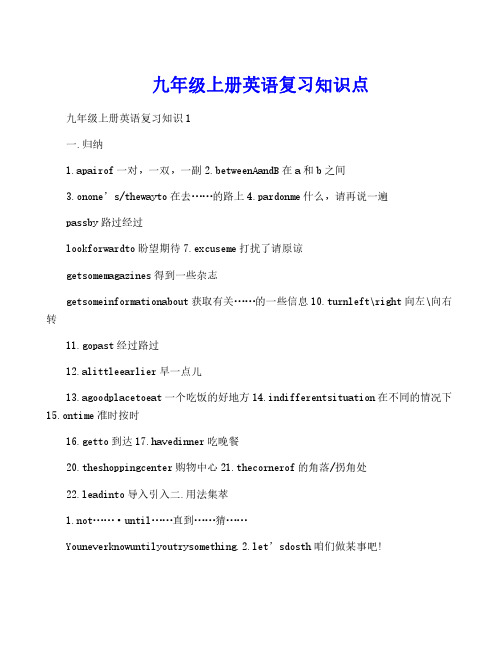
九年级上册英语复习知识点九年级上册英语复习知识1一.归纳1.apairof一对,一双,一副2.betweenAandB在a和b之间3.onone’s/thewayto在去……的路上4.pardonme什么,请再说一遍passby路过经过lookforwardto盼望期待7.excuseme打扰了请原谅getsomemagazines得到一些杂志getsomeinformationabout获取有关……的一些信息10.turnleft\right向左\向右转11.gopast经过路过12.alittleearlier早一点儿13.agoodplacetoeat一个吃饭的好地方14.indifferentsituation在不同的情况下15.ontime准时按时16.getto到达17.havedinner吃晚餐20.theshoppingcenter购物中心21.thecornerof的角落/拐角处22.leadinto导入引入二.用法集萃1.not……·until……直到……猜……Youneverknowuntilyoutrysomething.2.let’sdosth咱们做某事吧!3.spendtimedoingsth话费时间做某事4.thanksbfordoingsth为做某事而感谢某5.wouldliketodosth想要做某事lookforwardtodoingsth盼望做某事Itseems(that)…Itseemsarockbandplaysthereeveryevening.Couldyoupleasetellme...?Couldyoupleasetellmehowtogettothepostoffice?9.take的用法①takesomefoodtakesomemedicine(=have吃,喝)②takenotes做笔记③takeone’stemperature(测量)④Ittakessbsometime/moneytodosomething(花费,需要)⑤I’lltakethiscoat.(=buy购买)⑥takesomebody/somethingto(带领,拿去,取)⑦takeatraintoChongqing(乘坐)⑧takeoff(脱下)10.turn的用法turntopage80翻到Itisyourturn.轮到你了。
九年级上英语知识点总结

九年级上英语知识点总结一、基本语法知识点总结1. 时态和语态- 一般现在时:表示经常性、习惯性的动作或真理等。
- 现在进行时:表示现在进行的动作。
- 一般过去时:表示发生在过去的动作或状态。
- 过去进行时:表示过去某一具体时间段内正在进行的动作。
- 一般将来时:表示将来某个时间要发生的动作。
- 被动语态:表示主语是动作的承受者。
- 时态的混合使用:根据句意和上下文的要求,适当使用各种时态和语态。
2. 名词- 可数名词和不可数名词:可数名词可以用复数形式表示,不可数名词则不可以。
- 单数名词和复数名词:单数名词与复数名词的形式变化。
- 名词所有格:表示所属关系。
- 特殊名词的复数形式:如以f、fe结尾的名词变复数时,将f、fe改为v再加es。
3. 代词- 人称代词:第一人称、第二人称、第三人称的单数和复数形式。
- 物主代词:表示所属关系。
- 指示代词:this, that, these, those的用法。
- 不定代词:some, any, no, every, each等的用法。
4. 形容词和副词- 形容词和副词的基本用法和比较级、最高级的构成。
- 副词的作用:修饰动词、形容词和副词。
5. 动词- 动词的基本形式、过去式、过去分词和现在分词的构成。
- 动词时态和语态的变化。
- 动词的不同时态和语态的正确使用。
6. 冠词- 不定冠词a、an的基本用法。
- 定冠词the的基本用法。
二、常用短语和句型总结1. 完成时态和完成进行时的用法:have/has done和have/has been doing。
2. 祈使句和感叹句的特点及用法。
3. 特殊疑问句的构成和用法:以特殊疑问词(如what, where, when, why, how等)开头。
4. 间接引语的改写和使用。
5. 形容词和副词的比较级和最高级形式的构成和用法。
6. 连词的用法:and, but, or, so, because等。
7. 句子的基本结构:主语+谓语+宾语。
九年级上册英语的知识点总结

九年级上册英语的知识点总结九年级上册英语的知识点汇总一.短语归纳1.gethis driver’s license 取得驾驶执照2.noway没门,不行3.sixteen-year-olds 十六岁的人sixteen-year-old十六岁的4. be worried about=worry about 担5. have part-time jobs 做兼职工作6. get one’s ears pierced 打耳洞7. get / have / make sth. done 使某物被做……8. stop doing sth 停止做某事9. stop to do sth. 停下来去做某事10. spend time with sb. 花时间和某人在一起11.take photos, take a photo 照相e a flash 使用闪光灯13.all night 整夜14.stay by my side 呆在我身边15.make sure = be sure 确保,确定16.keep sb. (away) from sth使某人远离某物17. hurt oneself 伤害某人自己18. give sb. a hug = hug sb. 拥抱某人19.lift sb.up 举起某人20. cough badly 剧烈地咳嗽21. talk back 回嘴22. an adult 一个成人23. think back to 回想起24. regret doing sth. 后悔做了某事25. make one’s own decision 做某人自己的觉得26.too + adj.+ to do sth. 太…而不能做某事27.learn…from…从…学到…28.agree with sb 同意某人的观点29.disagree with sb. 不同意某人的观点30.move out 搬出去31.take care of = look after=care for 照顾32.manage one’s own life 管理自己的生活33.manage to do sth 努力完成某事34. that is why 那就是为什么…35.continue to do sth继续做某事36. take a test参加考试37.pass the test通过考试38.fail the test考试不及格39.be strict with sb in sth在某方面对某人要求严格40.get in the way of妨碍…41.a running star一个跑步明星42.a professional runner一个专业的跑步运动员43.grow up长大44.allow sb. to do sth.允许某人做某人45.should be allowed to do sth. 应该被允许去做某事46.have nothing against doing sth.不反对做某事47.succeed in doing sth.成功做某事48.fail to do sth. 做某事失败49.end up with 以…结束 end upas 最终成为50.practice doing sth.练习做某事51.see sb. do sth. 看见某人做了某事52.spend time on sth.在某事上花时间spend time in doing sth在做某事上花时间53. care about sb.关心某人54.talk with sb. about sth.和某人谈论某事55.make a choice做选择56.have a chance to do sth.有机会去做某事二.用法集萃1.She is a sixteen-year-oldgirl.=She is sixteen years old.2. allow sb. to do sth. 允许某人做某事(主动语态)be allowed to do sth. 被允许做某事(被动语态)Mother allows me to watch TV every night.LiLy is allowed to go to America.3. get their ears pierced 穿耳洞让/使(别人)做某事get sth. done(过去分词)have sth. doneI get my hair cut. == I have my hair cut.4. enough 足够形容词+enough 如:beautiful enough足够漂亮enough+名词如:enoughfood 足够食物enough…to 足够…去做…例:I have enough money to go to Beijing. 我有足够的钱去北京。
九年级上册英语知识点归纳

九年级上册英语知识点归纳一、词汇与短语1. 基础词汇- 学校相关:classroom, teacher, student, textbook, homework, etc.- 家庭与个人:family, parent, sibling, friend, hobby, etc. - 日常活动:morning, afternoon, evening, weekend, activity, etc.- 食物与饮料:fruit, vegetable, meal, snack, drink, etc.- 交通与旅行:bus, train, plane, travel, tourist, etc.2. 常用短语- 表达意见:in my opinion, I think, I believe, etc.- 描述喜欢与不喜欢:like doing/sth, don’t like doing/sth, prefer to do sth, etc.- 表达能力与可能性:ca n/can’t do sth, be able to do sth, it’s possible to do sth, etc.- 问路与指路:excuse me, how can I get to..., go straight on, turn left/right, etc.二、语法结构1. 时态- 一般现在时:表示经常发生的动作或状态。
- 一般过去时:表示过去发生的动作或状态。
- 现在进行时:表示正在进行的动作。
- 过去进行时:表示过去某个时间点正在进行的动作。
2. 语态- 被动语态:表示动作的承受者。
- 一般现在时的被动语态:am/is/are + past participle- 一般过去时的被动语态:was/were + past participle3. 非谓语动词- 动名词:表示动作的名词形式,如 swimming, reading, etc. - 分词:现在分词(doing)和过去分词(done)用作形容词或状语。
初三英语上册知识归纳

初三英语上册知识归纳
1. 词汇:
扩大词汇量:学习并掌握课本中的新词汇,同时通过阅读、听力等方式增加课外词汇量。
词性理解:理解并掌握名词、动词、形容词、副词等词性的基本概念和用法。
同义词和反义词:学习并掌握一些常用词汇的同义词和反义词,丰富语言表达。
2. 语法:
时态:学习并掌握一般现在时、一般过去时、一般将来时、现在进行时、过去进行时、现在完成时等时态的基本概念和用法。
语态:了解并掌握主动语态和被动语态的区别和用法。
直接引语和间接引语:学习如何将直接引语转换为间接引语,反之亦然。
定语从句和名词性从句:了解并掌握定语从句和名词性从句的基本结构和用法。
3. 句型:
简单句、并列句和复合句:了解并掌握这三种句型的基本结构和用法,能够识别并运用它们进行表达。
强调句和倒装句:学习并掌握强调句和倒装句的基本用法,丰富句型变化。
4. 阅读理解:
提高阅读速度:通过大量阅读,提高阅读速度和理解能力。
理解文章结构:学会分析文章的结构,找出主题句和关键信息。
猜测词义:学会通过上下文猜测生词的意思,提高阅读理解能力。
5. 写作:
写作技巧:学习并掌握一些基本的写作技巧,如分段、使用过渡词等。
写作练习:通过写作练习,提高写作能力,学会用英语表达自己的观点和想法。
九年级上册英语知识点

九年级上册英语知识点要把学九年上册英知看作一个体力活,要尽可能多地去接触英资料,不论是听的、的、写的和的,接触的多了,践的多了,英水平自然也会不停提升。
下边是小大家精心整理的九年英上册知点,供参照。
九年上册英知点1-2元Unit 1一:知点2.By: ①通⋯..方式 (门路 )。
例: I learn English by listening to tapes.②在⋯..旁。
例: by the window/the door③乘坐交通工具例: by bus/car④在⋯⋯从前,到⋯⋯止。
例: by October 在 10 月前⑤被例: English is spoken by many people.3.how 与 what 的区:how 往常方式或程度提,意思有:怎么如何,往常用来做状、表。
what 往常作的出者或接受者提,意思什么,往常做,主。
How is your summer holiday? It’s OK.(how 表示程度做表)How did you travel around the world? I travel by air.What do you learn at school? I learn English, math and many othersubjects.4.aloud, loud ,loudly 均可做副。
aloud 作声地大声地多与read、speak用比如: read aloud 朗 speak aloud作声来loud 大声地响亮地l oudly 大声地多指喧声和不动听的声音。
5.voice 指人的嗓音也指。
sound 指人能够听到的各样声音。
noise 指噪音、吵声6.find ++(名形容介短分等 )例: I find him friendly. I found him working in the garden.We found him in bed. He found the window closed.7.常的系有:①是: am 、is、 are ②保持: keep、 stay③:become、 get、 turn ④ ⋯⋯起来 feel、 look、 smell、taste、 sound8.get ++(形容去分不定式 ) 使某种情况生例:Get the shoes clean.把鞋擦干Get Mr. Green to come. 格林先生来I want to get my bike repaired. 我想去修自行You can’tget him waiting. 你不可以他老等着9.不定式做定①与所修的名组成主关系The next train to arrive was from New York. He is always the first to come.②与所修的名组成关系I have nothing to say. I need a pen to write with.I need some paper to write on. I don’thave a room to live in.10. practice , fun 做名不行数名11. add 充又12. join 加入某体并成此中一attend 列席参加会或座join in 与 take part in 指参加到某活中去。
九年级上册英语一至三单元知识点总结
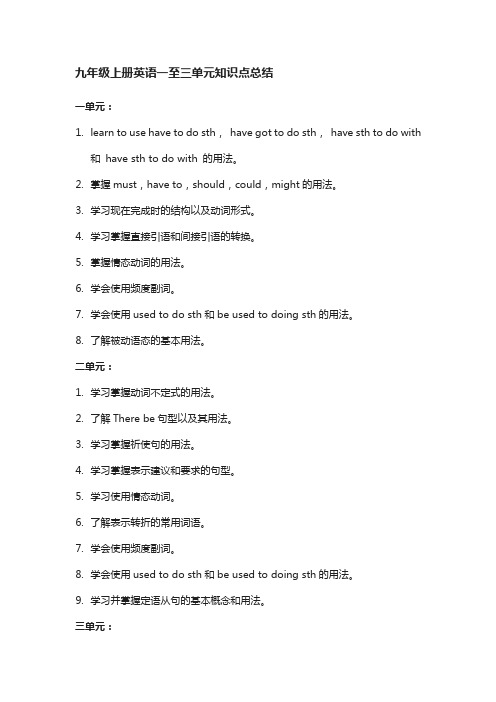
九年级上册英语一至三单元知识点总结
一单元:
1.learn to use have to do sth,have got to do sth,have sth to do with
和have sth to do with 的用法。
2.掌握must,have to,should,could,might的用法。
3.学习现在完成时的结构以及动词形式。
4.学习掌握直接引语和间接引语的转换。
5.掌握情态动词的用法。
6.学会使用频度副词。
7.学会使用used to do sth和be used to doing sth的用法。
8.了解被动语态的基本用法。
二单元:
1.学习掌握动词不定式的用法。
2.了解There be句型以及其用法。
3.学习掌握祈使句的用法。
4.学习掌握表示建议和要求的句型。
5.学习使用情态动词。
6.了解表示转折的常用词语。
7.学会使用频度副词。
8.学会使用used to do sth和be used to doing sth的用法。
9.学习并掌握定语从句的基本概念和用法。
三单元:
1.学习掌握过去进行时的用法。
2.学习掌握过去完成时的用法。
3.学习掌握现在完成进行时的用法。
4.学习掌握现在完成时的被动语态用法。
5.学习掌握情态动词的完成式用法。
九年级上册英语知识点大全
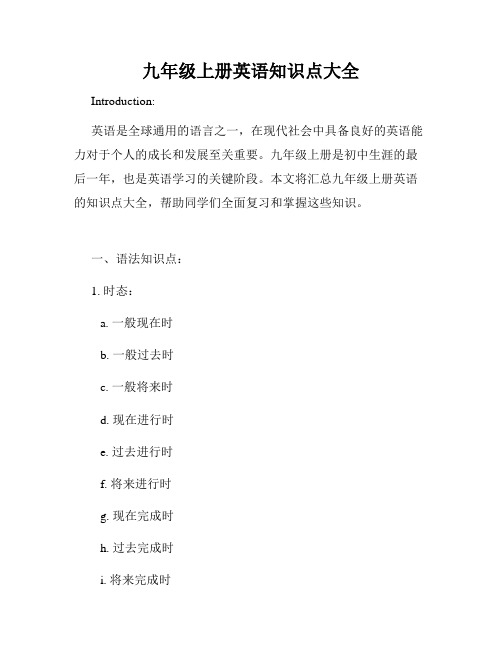
九年级上册英语知识点大全Introduction:英语是全球通用的语言之一,在现代社会中具备良好的英语能力对于个人的成长和发展至关重要。
九年级上册是初中生涯的最后一年,也是英语学习的关键阶段。
本文将汇总九年级上册英语的知识点大全,帮助同学们全面复习和掌握这些知识。
一、语法知识点:1. 时态:a. 一般现在时b. 一般过去时c. 一般将来时d. 现在进行时e. 过去进行时f. 将来进行时g. 现在完成时h. 过去完成时i. 将来完成时2. 从句的用法:a. 定义性从句b. 地点状语从句c. 原因状语从句d. 结果状语从句e. 条件状语从句f. 时间状语从句g. 目的状语从句h. 让步状语从句i. 方式状语从句3. 被动语态的构成和用法:a. 一般现在时的被动语态b. 一般过去时的被动语态c. 一般将来时的被动语态d. 现在进行时的被动语态e. 过去进行时的被动语态f. 现在完成时的被动语态g. 过去完成时的被动语态4. 介词的用法:a. 介词与名词搭配b. 介词与动词搭配c. 介词与形容词搭配d. 介词短语的用法及固定搭配二、词汇知识点:1. 同义词与反义词:a. 形容词、名词、动词的同义词与反义词b. 副词的同义词与反义词c. 介词与介词短语的同义词与反义词2. 词性转换:a. 动词转换成名词b. 名词转换成形容词c. 形容词转换成副词d. 副词转换成形容词e. 形容词转换成动词3. 高频词汇:a. 频率副词b. 数词c. 天气词汇d. 动作词汇e. 食物词汇f. 家庭成员词汇g. 爱好和活动词汇h. 学科词汇三、阅读技巧:1. 主旨大意题的解题技巧2. 推理判断题的解题技巧3. 细节理解题的解题技巧4. 排序归纳题的解题技巧5. 词义猜测题的解题技巧四、写作技巧:1. 日记的写作技巧2. 书信的写作技巧3. 邀请函和感谢信的写作技巧4. 描写人物和事物的技巧5. 议论文的写作技巧五、听力技巧:1. 听录音,提高听力理解力2. 记笔记,提取关键信息3. 多做听力练习,熟悉不同题型4. 注意听力材料的语速和语调5. 多与他人进行英语对话,增强口语听力能力结论:九年级上册英语知识点涵盖了语法、词汇、阅读、写作和听力技巧等方面。
初三英语知识点归纳总结及例题
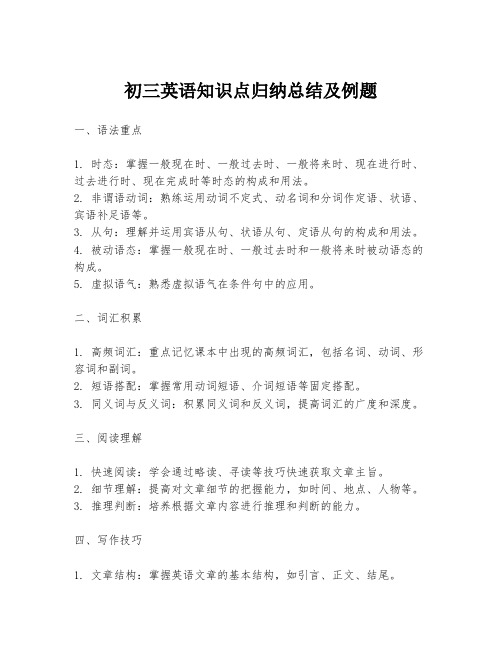
初三英语知识点归纳总结及例题一、语法重点1. 时态:掌握一般现在时、一般过去时、一般将来时、现在进行时、过去进行时、现在完成时等时态的构成和用法。
2. 非谓语动词:熟练运用动词不定式、动名词和分词作定语、状语、宾语补足语等。
3. 从句:理解并运用宾语从句、状语从句、定语从句的构成和用法。
4. 被动语态:掌握一般现在时、一般过去时和一般将来时被动语态的构成。
5. 虚拟语气:熟悉虚拟语气在条件句中的应用。
二、词汇积累1. 高频词汇:重点记忆课本中出现的高频词汇,包括名词、动词、形容词和副词。
2. 短语搭配:掌握常用动词短语、介词短语等固定搭配。
3. 同义词与反义词:积累同义词和反义词,提高词汇的广度和深度。
三、阅读理解1. 快速阅读:学会通过略读、寻读等技巧快速获取文章主旨。
2. 细节理解:提高对文章细节的把握能力,如时间、地点、人物等。
3. 推理判断:培养根据文章内容进行推理和判断的能力。
四、写作技巧1. 文章结构:掌握英语文章的基本结构,如引言、正文、结尾。
2. 句型运用:灵活运用各种句型,使文章表达更加丰富。
3. 逻辑连贯:注意文章的逻辑连贯性,使用恰当的连接词。
例题:语法填空The movie "The Lion King" is a popular animated film. Ittells a story about a young lion named Simba who becomes the king of the jungle after his father's death. Simba was bornin a royal family, but he was not always (1) ________ (responsible). He was curious and playful, always gettinginto trouble. One day, his father, Mufasa, took him to thetop of a hill to show him the kingdom. Mufasa told Simba that everything the light touches is their kingdom and he would be the king one day. However, Simba's uncle, Scar, was jealous and wanted to be the king. He (2) ________ (plan) to kill Mufasa and Simba to take the throne. After Mufasa's death, Simba was blamed for the tragedy and ran away from home. He met two friends, Timon and Pumbaa, who taught him to live a carefree life. But eventually, Simba realized his (3)________ (responsibility) and returned to the kingdom tofight against Scar and reclaim his rightful place as the king. 答案:1. responsible2. planned3. responsibility通过以上知识点的归纳总结和例题的练习,希望能帮助初三学生更好地掌握英语知识,提高英语水平。
九年级上册英语单词知识点

九年级上册英语单词知识点九年级上册英语单词知识点是学习英语中的重要部分,掌握好单词的意思和用法,对于提高英语水平和应对各种考试都非常关键。
下面是九年级上册英语单词知识点的详细介绍:一、名词类单词:1. Student(学生)- a person who studies at school2. Teacher(老师)- a person who teaches3. Book(书)- a written or printed work consisting of pages glued or sewn together along one side and bound in covers.4. School(学校)- an institution for educating children or teenagers.5. Classroom(教室)- a room in a school where lessons take place.6. Homework(作业)- school work that a student is required to do at home.7. Test(测试)- a set of questions or exercises designed to measure someone's knowledge or ability.8. Exam(考试)- a formal test of a person's knowledge or proficiency in a subject or skill.二、动词类单词:1. Study(学习)- the devotion of time and attention to gaining knowledge of an academic subject2. Learn(学习)- gain or acquire knowledge of or skill in (something) by study, experience, or being taught.3. Read(阅读)- look at and comprehend the meaning of written or printed matter by mentally interpreting the characters or symbols of which it is composed.4. Write(写作)- mark (letters, words, or other symbols) on a surface, typically paper, with a pen, pencil, or similar implement.5. Listen(听)- give one's attention to a sound.6. Speak(说)- say something in order to convey information, an opinion, or a feeling.三、形容词类单词:1. Smart(聪明)- having or showing a quick-witted intelligence.2. Friendly(友好)- kind and pleasant.3. Hardworking(勤奋)- tending to work with energy and commitment; diligent.4. Polite(有礼貌)- having or showing behavior that is respectful and considerate of other people.5. Clever(聪明)- quick to understand, learn, and devise or apply ideas; intelligent.四、副词类单词:1. Well(好地)- in a good or satisfactory way.2. Always(总是)- at all times; on all occasions.3. Never(从不)- at no time in the past or future; not ever.4. Often(经常)- frequently; many times.5. Sometimes(有时候)- occasionally; at times.五、其他类单词:1. Hello(你好)- used as a greeting or to begin a telephone conversation.2. Goodbye(再见)- used to express good wishes when parting or at the end of a conversation.3. Thank you(谢谢你)- an expression of gratitude or politeness, in response to something done or given.4. Please(请)- used to ask for something in a polite way.5. Sorry(对不起)- feeling regret, compunction, sympathy, pity, etc.以上是九年级上册英语单词知识点的介绍,掌握这些单词的意思和用法,对于学习英语会有很大的帮助。
- 1、下载文档前请自行甄别文档内容的完整性,平台不提供额外的编辑、内容补充、找答案等附加服务。
- 2、"仅部分预览"的文档,不可在线预览部分如存在完整性等问题,可反馈申请退款(可完整预览的文档不适用该条件!)。
- 3、如文档侵犯您的权益,请联系客服反馈,我们会尽快为您处理(人工客服工作时间:9:00-18:30)。
初三上学期英语知识点同学们在学初三上册英语知识的过程中要掌握学习的方法,所以说归纳对于英语语法的学习是非常重要的。
小编整理了关于初三英语上学期知识点,希望对大家有帮助!初三上学期英语知识点第一部分I. 重点短语1. at the moment2. used to3. for a while4. walk away with sth.!5. leave for some place6. sooner or later7. pay for8. come up with an idea9. think of10. have a try11. all over the world12. be famous for#13. large numbers of14. all the year round15. no matter what16. give up17. for example18. by the way19. on business20. so far<21. come true22. set off23. slow down24. go on doing25. wait for26. be proud of27. be afraid of28. speak highly of|29. a year and a half30. half a year31. pick up32. as soon as33. keep… clean35. cut down36. make a contribution to)37. base on38. make sure39. take away40. begin with41. right now42. as soon as possible43. leave a message44. all kinds of things…45. walk around46. fall asleep47. wake up48. go on a trip49. have a good time50. take photos51. come out52. come on\53. have a family meeting54. talk about55. go for a holiday56 go scuba diving57. write down58. by oneself59. walk along60. get a chance to do sth#61. have a wonderful time62. book a room63. have an accident64. be interested in65. use sth. to do sth.66. make a TV show67. be amazed at68. take part in]69. feed on70. get out ofII. 重要句型1. Why don’t you do sth.?3. borrow sth. from sb.4. forget to do sth.5. pay fro sth.《6. return sth. To sb.7. learn sth. from sb.8. be famous for sth.9. No matter what…10. be with sb.11. go on doing sth.12. speak highly of sb.13. keep doing sth.'14. allow sb. To do sth.15. encourage sb. to do sth. 16. It is said that…初三上学期英语知识点第二部分III. 交际用语1. --- Excuse me, have you got …?--- Yes, I have. (Sorry, I haven’t.)2. --- Why don’t you …?--- Thanks, I will.>3. --- Thanks a lot. (Thank you very much.)--- You are welcome.4. --- Have you ever done…?--- Yes, I have, once. (No, never.)5. --- I’ve just done…--- Really?6. ---What’s …like ?7. --- How long have you been…?\--- Sinc e…8. --- Have you ever been to…?--- I’ve never been there. (None of us has./ Only …has. )9. --- Would you like to have a try?--- I don’t think I can…10. --- What have you done since…?11. --- How long have you been at this …?--- For……12. --- How long has she/ he worked there…?--- She’s / He’s worked there for… / all her / his life.13. --- I’m sorry he isn’t here right now.14. --- May I help you?15. --- That’s very kind of you.16. ---Could we go scuba diving?17. --- Could you tell us how long we’re going to be away?18. --- Let’s try to find some information about it, OK?"19. --- Could you please tell me how to search the Internet?20. --- Go straight along here.21. ---Please go to Gate 12.22. --- Please come this way.23. --- Could you tell me what you think about Hainan Island?24. --- That sounds really cool!IV. 重要语法1. 宾语从句{2. 现在完成时3. 一般过去时与现在完成时的用法比较:【名师讲解】1. Maybe/ may be(1) maybe是副词,意思是“大概,也许”,常用作状语。
Maybe you put it in your bag.也许你把它放在包里了。
“Will he come tomorrow?”“Maybe not.” “他明天来吗?”“也许不”。
(2) may be相当于是情态动词may与be动词搭配一起作谓语,意思是“也许是…,可能是…”。
,It may be 9:00 when they arrive.他们可能于九点到达。
The man may be a lawyer. 那人也许是律师。
2. borrow/ lend/ keep/ use(1) borrow表示的是从别人那里借来东西,即我们通常所说的“借进来”。
We often borrow books from our school library.我们经常从学校图书馆借书。
I borrowed this dictionary from my teacher. 我从老师那儿借来了这本字典。
borrow是一个瞬间完成的动作,因此不能与时间段连用。
You can borrow my recorder for three days. ( 错误),I have borrowed this book for only one week. ( 错误)(2) lend表示的是把自己的东西借给别人,即我们通常所说的“借出去”。
Thank you for lending me your bike.谢谢你把自行车借给我。
He often lends money to his brother.他经常借钱给他弟弟。
lend与borrow一样,也是一个瞬间完成的动作,不能与一段时间连用。
(3) keep的意思也是“借”,但一般是指借来后的保存或使用阶段,是一段持续的时间,因此可以与时间段连用。
You can keep my recorder for three days.我的录音机你可以借用三天。
,I have kept this book for only one week.这本书我才刚借了一星期。
(4) use也可以当“借用”讲,但它的本意是“用,使用”。
May I use your ruler? 我能借你的尺子用一下吗?He had to use this public telephone.他不得不使用这部公用电话。
3. leave/ leave for(1) leave意思是“离开,留下”。
We left Shanghai two years ago.我们两年前离开了上海。
He left his cell phone in the taxi last week.他上周把手机落在出租车里了。
、(2) leave for意思是“前往”,表示要去的目的地。
We will leave for Tibet next month.我们将于下月去x藏。
The train is leaving for Moscow.这趟火车即将开往莫斯科。
4. since/ for(1) since用于完成时态,既能用作介词,也能用作连词,后常接时间点,意思是“自从”。
He has been a worker since he came into this city.自从他来到这个城市,他就是工人了。
I have never seen him since we last met in Shanghai .;自从我们上次在上海见过之后,我再也没见过他。
